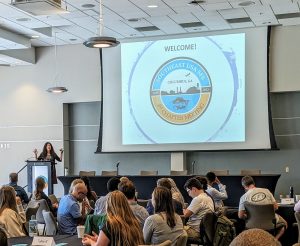A new local Southeast chapter of an international scientific society is helping to promote understanding of freshwater ecosystems.
The Southeast USA chapter for the Society for Freshwater Science recently held its inaugural science meeting in Columbus, Georgia. More than 130 attendees gathered for workshops and networking opportunities concerning strategies in preserving and improving freshwater resources.
“Overall, I think this first meeting really indicated the need to bring together the Society for Freshwater Science group together in the Southeast,” said Dr. Carla Atkinson, chapter president and associate professor in The University of Alabama’s Department of Biological Sciences. “I hope it will foster a better sense of community and collaboration.”
Leading off the meeting was Dr. Anna George, vice president of conservation science and education at the Tennessee Aquarium. She was joined by Dr. Seth Wenger, director of the University of Georgia’s River Basin Center. During their plenary address, they discussed strategies for raising the awareness and profile of southeastern aquatic biodiversity.
Attendees took part in 31 oral and 44 poster presentations, which included student awards. There were also two workshops available. One focused on helping participants identify mentors and their mentoring needs for their research objectives. The second centered on social field safety, a concern for researchers with marginalized identities. This session focused on mitigating the risks of physical, psychological and emotional harm and distress due to discrimination while conducting research in the field.
The Alabama Water Institute sponsored lunch for the Social Field Safety workshop and student awards.
The Southeastern U.S. boasts a wealth of freshwater resources and is host to a remarkable array of freshwater wildlife. More than one quarter of this area’s species are not found anywhere else in the world. However, this unique and biodiverse region faces significant threats from widespread agricultural activities and urban expansion, exacerbated by a lack of adequate investment in conservation efforts.
The mission of the chapter is to support and facilitate communication among SFS members working in southeastern freshwater ecosystems, as well as providing a bridge for non-SFS members to connect with the society and enhance engagement with other groups. It also fosters exchange of scientific information among the membership, including with other professional societies, resource managers, policy makers, educators and the public across the Southeast.
Information from the chapter’s website was used in this article.

